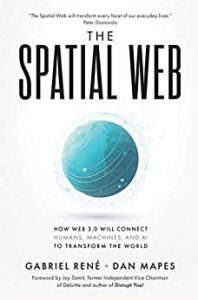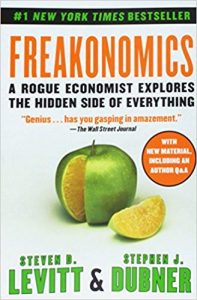Thank you, Stephan. It’s good to be here.

Let’s talk about the Spatial Web. For many of our listeners, I have a feeling they’ve never even heard that term before. Let’s define it for them.
Yeah. I think one challenge we’ve had ever since the term Web 2.0 came out is defining Web 3.0. That only covers most of the technologies that we consider part of our networking technologies. In the industrial space, we tend to use the term Industry 4.0 becoming very popular. If you look at the larger social and governance implications of the future, you might hear more commonly a Civilization 5.0 or Society 5.0. In fact, the Japanese Prime Minister has been talking about that a lot lately.
But the point is that we’re at a transition point in humanity’s relationship to our technology. Whether we call it Web 3.0, or Industry 4.0, or Society 5.0, it’s really about our relationship to these new emerging exponential technologies, artificial intelligence, augmented and virtual reality, blockchain, cryptocurrencies, the internet of things; which is all appliances and smart devices that are moving into our lives. These will become part of a new stack of technologies that must work together in a new way but are lacking the type of protocols that keep networking technologies that tend to create networks.
Whereas the web today uses HTTP, the World Wide Web, and the Internet uses what’s called TCP/IP, two different types of protocols for networking and communicating. We’re really lacking something that would connect holographic content and information, devices that are embedded in our environment, homes, cars, classrooms, and even in our bodies. Artificial intelligence powering those things available wherever we want. Cryptocurrencies, digital payments, and blockchain enabling transactional environments where we have this Amazon Go for everything. We’re in and out of an Uber-like today but you might walk in and out of a retail environment or purchase something without having to actually swipe your credit card.
The idea here is that all of those various technologies connected by a new protocol which we call hyperspace transaction protocol is what forms the Spatial Web. The Spatial Web is described this way because more or less the main trend that we see here is about computing and moving from behind the screens into the world around us. Some people call it ubiquitous computing, ambient computing, distributed, decentralize, edge, or spatial. We just default that to the term spatial, the fact that all things then become connected, it’s the internet of everything, of making it a web and hence, we arrived at the Spatial Web.
This sounds like a huge game-changer. What does this look like to Joe the Plumber? To every man or every woman?
There’s a path that many of us expect to move fairly quickly from Joe the Plumber being Cyber Joe the Plumber where he’s having an augmented reality experience—which I can walk you through in a second—to Joe not the plumber anymore where he’s overseeing robots doing that to Joe the robot director to hopefully Joe on a beach. Because in the end, plumbing may not be something that Joe needs to do because plumbing will be smart enough to manage itself. In phase one, we have to recognize that we go through these interface stages with our technology.
We’ve gone from more or less punched cards to the keyboard and mouse to the multi-touch screens we use today. Now we’re moving into this holographic interfacing that’s going to come with voice, gesture, augmented reality glasses, and VR glasses, more similar to what you might see in Iron Man. What I like to call this is the Starkification of reality. For those that know who Tony Stark is, the character that plays Iron Man, Robert Downey, Jr. does a great job within the Marvel movies. If you watched any of those films and many other sci-fi films, you see people interacting with holograms in space.
We're at a transition point in humanity's relationship to our technology. Share on XJoe the Plumber is going to be able to actually see through walls. He’ll be able to see exactly where the pipes are. He’ll be able to ask the AI that manages the house exactly where the clog is. He’ll be able to see that visually. They might be able to put something in there that’s a little closer to some little bot that goes in and removes the tangle as opposed to pouring chemicals into it. That’s Joe the Plumber Spatial Web interaction.
Whereas today, he might only be using the web to give him navigation or information to get to the house that he’s supposed to work at. Once he gets into the building, he can’t access the blueprints, the CAD file, the 3D information about how the building was put together. He can’t certainly take that three-dimensional blueprint and lay it over the building itself and see where all the pipes are. He’s got it going in and guess or he’s got to route his way through a pipe using various mechanical tools. Those tools become electronic and smart. He’s interfacing with AIs and sensors and being able to see through walls. It’s a bit of a set of superpowers here.
The listener might think, “Why do you even need a plumber at all? Can’t AI and robots just replace the plumber?
That is one of the existential questions of the century. I don’t have an answer for it, I have guesses. What likely happens is first, what we get are augmented humans. Then what we get are smart things that are able to operate themselves. If you look at biological systems, there’s a really interesting word that we don’t use today with our technology systems very much but I would guess is where they’re going, it’s the word autonomic.
Today, you and I are able to sit here and have a very high-level conversation about the future because we don’t have to actively worry about pumping our hearts, breathing, or all of the bodily functions that are occurring, the plumbing in our body. It’s happening automatically but it’s happening autonomically, meaning, it doesn’t require any of our active involvement in order to function. In a way, what’s happening is that our systems in the world, our industrial systems, our mechanical systems by virtue of computers and by virtue of the different categories of computing we’ve talked about and the ability for those to learn and even adapt a bit with AI, we’re getting to the point now where human involvement will not be necessary to have certain system-level functions occur. They become more algorithmic, they become autonomic, meaning, that they’re able to function by themselves.
This, obviously, leads to all kinds of interesting ethical concerns and considerations, but at a very utilitarian practical level, what that means is that the sheer labor efficiency and productivity of a system, any system, could be how a car runs, it could be how our electrical grid runs, it could be how our plumbing works in our home can become autonomic. Autonomic systems don’t require our involvement. What that does is it frees us up to do other things like having really interesting conversations about the future or maybe Joe enjoying a piña colada on the beach.
That’s awesome. Now, I’ve actually heard futurists and AI professionals refer to AI as it will stand for autonomous intelligence in the future rather than artificial intelligence because what’s the distinguishing factor that says this is artificial and not real? If AI gets to a point of sentience or being able to outsmart us, why would we consider it artificial? It’s just autonomous.
Historically, we’re really bad at naming things in the future. We all remember the information superhighway. Those of you who don’t, you’re welcome, now you know what horrible name we used to have for the World Wide Web, which also we don’t really use. We conflate things like the Internet and the web which are two different things, although one runs on top of the other. When we talk about things like artificial intelligence or we call it autonomous intelligence, or let’s say, today, you and I could rebrand it, let’s say it’s going to be autonomic intelligence, it doesn’t really matter because the really important word there is the intelligence.
If you look at the definitions of intelligence by many different parties and groups and even different fields in science, you typically find a theme. The theme is a system that can sense its environment or sense information. Because of that sensing, it’s able to run some simulation, it’s able to take an action, and then it can sense the effect of that action and that can repeat the process. More or less, in high-level technology theory, this is called cybernetics. It’s really a feedback loop. If you have a system that can basically provide a feedback loop whereby it can learn, this is the definition of intelligence, the option to improve.
Others describe intelligence as a system that maximizes its future options to take action at the last possible second. Whatever we end up calling it, what we want it to do is be able to improve our lives, our well-being, our quality of life at scale. If it can’t do that, whatever we end up calling the A-part of it, it’s not going to result in something that we fundamentally consider having been very smart.

The other part of this that is maybe more important is that we have this tendency to consider technology an alien invasion that somehow there’s something distinctly different from nature and technology, which isn’t really possible. Marshall McLuhan was quoted as saying technology is an extension of man. We can extend our arms, we extend our brainpower, we extend our different functions of the human being into pulleys, levers, and everything we’ve done from the beginning until now and going forward.
But since man is just an extension of nature, technology is just an extension of nature. We’re going to, in the 21st century, arrive at this point where the distinctions between nature and technology fade away. That may require us to go through a period where we have a technophobic reaction to these things because it feels like it’s changing what we consider to be our stable reality. In fact, one might argue this is just the natural process of evolution and nature is just doing its thing and we’re having different reactions to that. The whole concept of artificial to me doesn’t work because what’s really happening is just another form of intelligence is expressing itself in nature. The question is really how do we communicate together, how do we cooperate together, and how do we collaborate in a way that really sustains and assists life which is the main function of nature.
Yeah. Just to recap here, phase one is the Starkification of reality, augmented humans, AI glasses, all that. Phase two is this autonomic intelligence that doesn’t require humans to get involved in order to solve the problem whether it’s a clogged sink or whatever. Is there a phase three? Did I get those first two phases right as far as summarizing them?
Yeah, you’re going to force me to write a new book here because neither of those two points are in the book, but they sound really good when you say it that way. Those sound very accurate to me. Phase three is pretty out there. Phase three is the possibility that the planet can operate as a smart world, not just smart glasses, smart cars, and smart contracts or even smart cities, but smaller cities connected to other smart cities, connected to other smart things. Those each being nodes on a planet that is inter-operable and networked together. If it’s the internet of everything, then we end up with a smart world where this supply-chain like functions and mechanical functions become autonomic.
But the planet itself functions almost like an organism. If you look at our supply chain today, you look at the internet, you look at the electrical cables we’ve strung, you look at our roads, we’ve all seen these images of certain patterns that consistently form in nature. We see them in the way that we end up mapping a lot of these are technologies across the planet both from an ideological perspective—and this is where you get to this Society 5.0 idea—and from a technological perspective, I think we have the possibility in this century to actually build a smart world.
Wow. Do you think nation-states disappear in that smart world?
I would say nation-states evolve. The function of a nation-state is to, more or less, manage the systems of a society. Those systems have been bound by geographies, but they’re no longer going to be bound by geographies in part because virtual reality is going to play an entirely new role in our lives. Much like books, movies, and games have played these kinds of roles inside of our minds but are very difficult to share.
Gaming has become a dimension where two billion people a month actively participate with other people by running around and having these experiences in these virtual environments behind screens. When that moves into virtual environments that we experience that are indistinguishable from reality, which this next generation of technologies is enabling in things like Neuralink that you’ve seen Elon Musk and others announce where we’re jacking into the matrix, fundamentally change the landscapes by which we’re interacting.
The concept of even governmental oversight in a virtual world that doesn’t technically have any geographical location opens up all interesting governance questions. In many ways, we’re going to shift from an era that was similar to what we saw in the age of feudalism into something new. Many of us are trying to anticipate what that is and see what advantages come from that and consider what some of the disadvantages might be and prepare for that in advance so that we can really maximize the positives and reduce the negatives. It’s really difficult to predict from here because we’re talking about phase shift that suddenly fundamentally evolves our definitions beyond what we’re aware of right now.
As humans, we must communicate, cooperate, and collaborate in ways that will sustain and assist life. This is how we secure our future. Share on XIt brings a whole new definition to the phrase disruptive technologies, right?
Yeah.
In the future, will currency in the form of the US dollar, the Euro, and so forth even exist? Because you could have companies that are global entities more powerful than many of the countries that exist basically coming in with their own currencies to trump everybody else’s including a lot of nation-states.
Yes. In the near term, that’s what we can expect. Facebook has announced Libra which is the first post-national global currency. Congress in America is freaking out.
I’m freaking out.
They should be freaking out.
I think it’s horrible. Libra is a terrible idea. It goes against everything that decentralization, the open Internet, and everything stands for. I would like it squashed, but who knows what’s going to happen with that?
There are some things that have happened in the past that might indicate a future for Libra, Amazon Coin, AppleCoin, and everything that’s also coming after this. We saw this in the early days of the web. This was called AOL. It was called Prodigy, CompuServe, and a couple of others. Probably about half the audience may be listening today doesn’t even remember those. What they were were what we called, those of us that were more supportive of an open web which was built on a decentralized standard that had no nation controlling it and no corporation that owned. It was that AOL, CompuServe, Prodigy, and others basically made an on-ramp to the web because, in the early days, other than a couple of browsers, most people didn’t understand what the web was, they were afraid of the web. They didn’t know how to interact with it. They weren’t quite sure what it was good for.
Companies like AOL, which stands for America Online really helped pave the way to get America and then by the rest of the world online. You got mailed this little CD-ROM, you put it into your computer. You went through this whole process. Then you went into this private little sub-room of the web which was their little walled garden. You couldn’t read everything. All the newspapers, you couldn’t just read The Wall Street Journal.
On the other one, maybe you could read the New York Times. At one point, you could start to book airline flights but it was only with United. We’ve also seen this similar thing when the iPhone first came out. Only a few carriers were able to support it. In the end, this was actually one of the great accelerators to getting more and more people online. Once you realized, “Hey, now I got the hang of this thing, I want to get outside the sandbox here.” They all died and the web exploded. The next generation of companies really didn’t do that. Many of whom were seeing trillion-dollar market caps today.
I think Facebook is AOL 2.0. From my point of view, I welcome them going for anything that looks like a walled garden even if it’s a bit of a wolf in sheep’s clothing for two reasons. One, I think it just accelerates adoption. Cryptocurrencies, the new web in the sense that the same fears and worries people had about the web in the early 90s is how the average person reacts to cryptocurrency today like, “I don’t quite get it. It’s confusing. It seems a little scary.” I think that’s part one of the benefit. I don’t think it will succeed in the long run because of #openstandards.
But the other thing that’s really interesting is that I don’t think that Facebook’s real strategy here is a cryptocurrency itself. Last night I just watched The Great Hack, which just came out on Netflix, which is about the Cambridge Analytica scandal. It’s a pretty amazing documentary and exposé. What becomes really clear in that documentary, if not from everything else that we’ve read, is that possibly the number one challenge of the 21st century for society at large is the question of data ownership and the question of whether or not whose data it is and whether or not data should be considered personal property and whether or not it’s a human right to be able to have control over it. Facebook’s entire business model is predicated on the idea that they own the data and that they can resell it.
Even if congress steps in and all international courts pop up or they get a five billion dollar fine, they can like, “Yeah, we jumped four points after the stock went up 4%, after it was announced we were fined five billion dollars.” It’s not actually a big hit to them from a capital perspective.
However, if you and I were part of a group, let’s say, in the last 18 months looking at cryptocurrencies to the point where we actually said we’ve got a plan to release one, we’re going to call it Libra, we’re going to get some of the largest companies in the world, especially some of the largest of payments providers to participate in this, do you think that there’s a possibility that someone at some point in that room said, “Hey, what are we going to do about our real problem which is the fact that we don’t have the ability to pay people for their data because it’s not their data, but this regulatory environment keeps heating up and we’re going to get larger and larger fines? What if the token could act as a way to grant people maybe their own rights around their digital data and their data as a property that we could pay them to monetize their data for them?”
In fact, the easiest way to monetize their data is through us because we’re the number one guys at monetizing data. It shifts from “it’s Facebook’s data to it’s your data.” By the way, Facebook as a service can now pay you through Libra coin which is the only way you can really get that. Of course, now everyone wants to maximize the value of their data. Suddenly, Facebook, over the next five-plus years, is able to reverse course and survive the next several decades as opposed to dying out. I think companies that are going to rely 100% on reselling other people’s data, which turns out in a recent report that just came out even so-called anonymized data. If you’ve got more than four or five data points, there’s a 90% plus chance that you’re no longer anonymous. That fallacy is all come apart here. That part of the strategy for Libra is ultimately to act as a payment method for people in order to sustain Facebook’s longevity as a business.
It’s a Trojan Horse then?
Yes. One that I think is really smart because they could even fail at that or that could take twice as long as we may think and they’re still able to make a significant amount of money. Controlling the money is what governments have done really well. It’s incredibly concerning. They’ve put it out here in advance knowing that congress was going to have an allergic reaction and this gives them several years to get their act together, get the approval, and get everyone else comfortable with the idea, answer all the questions, and go through the process. Things can come to dump on all of us to make sure we’re asking the right questions around this. If, in fact, it’s a Trojan Horse, maybe we should get the horse out in the light here and say, “Hey, what about our data? Let’s have that conversation. Is this something you intend to support with Libra?” Get them to start responding to yes or no and start to see how we feel about those answers because that’s really the battle of the century.

Have you heard the expression that information wants to be free?
Yes.
Our data wants to be free, would you say that’s applicable as well?
Yes. I think that’s right. There’s a model, it’s called DIKW, are you familiar with it?
I’m not.
It’s this idea that if you think of data as a raw format like oil you might pull out of the ground, it would go through a refinement process to the point where you could actually then use it in a vehicle and get something specific out of it. The DIKW model is called data, information, knowledge, wisdom. It’s the idea that by refining data, we go through a process of taking raw information. Raw data was distinguished there that data is just what’s the data that’s available in an environment, information is once it’s been collected. Knowledge is once you’ve made some context out of that. Wisdom is using that, let’s call it knowledge in some action that you can take in the world.
Interestingly enough, one could argue that’s the intelligence cycle itself. It’s sensors capturing data, processing that data into information, making some context out of it, and then apply and then taking in action as a result of it. I wouldn’t say that information wants to be free, I would say that data wants to become wisdom.
I like that. That’s profound.
That’s where value comes from so you can see that the value extraction process is to take data, use AI to contextualize it, and in this case of Facebook, no one else, do some matchmaking around who wants to buy it and then try to get those buyers trying to get you to take some action to buy their product. Their value is the process of converting data into, let’s call it wisdom and that is economic output. If we don’t own that economic output, if we don’t have the ownership of the first part of that thing, then very plainly, the value is going to a third party. There’s a really super solid argument not only that the information wants to be free—which I think is accurate—but that data wants to become wisdom, but that process is what generates value and that can’t be monopolized by institutions, whether they’re governmental or corporate.
Let’s bring this down to a current-day level of just the web manager, web marketer watching their Google Analytics. Where is that in the DIKW model and where is actionable insights that they glean from that reporting that they then make some change in their strategy? Where is that fit in that DIKW model?
I would say that is the basis of analytics. This is the whole thing about big data like, “Give me the data. Let me try to make some sense of it.” In the early days of Google Analytics, it didn’t help you all that much and now it does quite a bit of work. There are all kinds of third-party services now that are able to take all datasets, third party, first-party datasets you collect on your website, buying third party data from others—this is how the Cambridge Analytica thing began—Axium and other companies that do this as well and use that data to really try to figure out, for those of us, let’s say with them with more pure intent, “Hey, I’ve got this product. I want to sell it on my website. I want to understand more about where are people actually want my product. I don’t actually want to pitch to people that don’t, it’s expensive. How do I find them? How do I let them know what the benefits are of my product for them and for their lives? Then how do I get them to believe me, then finally go through this whole transactional payment process where I need enough information about them to be able to send it to them? I need your address, your name, whatever, and I need a credit card or some form of payment.” That process is online advertising and online marketing.
The problem with online marketing in Web 2.0, which is something we want to fix in Web 3.0, is that more or less a 1% success rate is considered failure in pretty much any business, but online, they were great because there’s so much obscurity and because of the anonymous nature of web users. This goes back to data and identity. If I’m trying to sell something or I’m advertising across the web for people to come and purchase my products, my services, I don’t know who’s a bot, I don’t know who’s a real person, I can’t verify, validate, or authenticate that, so it’s this big game of finding a needle in a haystack.
With all of the optimization techniques we’ve developed over the last 25 years, it’s still incredibly difficult. Everything has its own set of challenges. SEO, as you know, has its challenges, content marketing has its challenges, and we all make this layer cakes of different techniques to try to keep up. Now we’ve gone from simply being online to multi-channel to omni-channel to emerging offline and online, but the real thing this comes down to is fundamentally identity.
Knowledge is adding context to data. Wisdom is using that information to act in to the world. Share on XIf there was a universal ID for people that was a digital ID that could be verified, then all of that data that I collect as an individual about my likes, my preferences, my tastes, I could then make that available for you as an advertiser, as someone marketing to me online, and you could know, “Oh, I’m a real person. I’m actually providing you information that can be verified.” That suddenly reduces that risk profile as an online marketer because I’m able to target people with some real confidence. It really eliminates this online shadow data economy because I frankly don’t trust those datasets because I have to get this patchwork quilt of data and try to spend so much money to try to validate what is real, what’s not a bot, what information correlates to other information sets.
Also, I can sell you my product or service that I’m trying to find the right customer for. When we look at data ownership, we look at property, data policy, data rights, and we start to think about identity as part of that because if, in fact, your data is yours, then who are you? Identify you by your phone number? By your driver’s license? By what? What is your web ID? We don’t log in to the web, we log into other party services.
What if everyone else had the ability, the option to have user agreements with us? Instead of me signing a Facebook user agreement or Google user agreement to use their services, if they want my data, what if they had to sign something with me? There were certain privacy considerations and intense regulatory frameworks and policy wrapped around that, then I could monetize my data directly. You, as an advertiser, would probably far more preferable that you had access to accurate, verified, and even real-time and updated data just because you saw me shopping for a mattress a week-and-a-half ago.
Now you’re paying for your Bed Bath & Beyond and now I came to your site, I looked at a mattress, and then I decided, “Hey, guess what? My cousin just bought two mattresses. They were thought one that’s going to fit in the house, they didn’t. They brought it over and they put it in the house.” But now you’re chasing me around the web with more and more ads, trying to get me to buy a mattress. I already got a mattress, but you don’t know that. But if my deed was being updated in real-time, then you might know that I had a mattress so you’re not going to retarget me with ads and waste all this money. You might just say, “Hey, how about a new comforter and some pillows?” by which case I say, “Wow, this sounds great.”
The Spatial Web changes the nature of advertising in two ways. In one way, it makes it so that the polarity of data and the validity of data has the possibility of reversing so we can have highly valid data that’s highly relevant coming from individuals and so the matchmaking process can be much more seamless and far less costly. Then secondly, because we end up in a world that ends up being a holographic content and layers layered around the world in ways that we would have the ability to set permissions, privacy, and filters so we’re not overwhelmed by data in the environment, but right now, the gap between me seeing something, buying it, and having it delivered takes quite a few steps and a long time.
In a Spatial Web environment, if I’m walking down the street and I see something, I could see a holographic version of a new car, I could actually spin the car around. I could step inside of it and say, “Give me a whole experience of driving down highway one.” This entire experience that’s happening on the street and then have them send the car to my house to be there when I get home.
Advertising turns into more closely to commerce interactions. As you start to move into digital interactions, virtual content, virtual worlds, things that are more experiential, the gap between advertising and commerce really starts to fade and everything becomes contextual commerce. Drones could deliver you something very quickly in the future. The real-time nature of that becomes incredibly valuable, but all that comes back down to really what are our sources of data and what’s our ability to validate an identity?
Yeah. I hope that Bed Bath & Beyond is listening to this. It’s very possible because they were SEO clients of mine for a while. I did some great work with them.
This is a whole new world. If companies like Bed Bath & Beyond—and I have worked with Sony, Chanel, and so forth—they’re more likely to get this, to leverage it, and not be on the back foot than Joe the Plumber, or the small business person, or the freelancer, or the marketing consultant who’s got a handful of different clients. Those folks are potentially going to get left out in the dust or left out in the storm or whatever and not even know what’s going to hit them.
It’s really important for us to wrap our heads around this idea of a digital identity because we can go into our wallet and pull out our driver’s license. We know where our passport is, there’s an issuing authority. There’s one thing if we lose our passport, that’s a big pain in the butt to replace it, but digital identity, there is no one token or thing that we can point to that’s like, “This is it.” It’s across all these different websites—Netflix, Facebook, Google, and so forth all have a portion of our identity that they own and control for the most part. There’s no central location and it’s not in our control.
Yes. If you look at some of the regrets that the architects of the World Wide Web have, one of them is that they didn’t address security inside of the earliest version of the protocol. The other is that they didn’t address identity. The third one, ironically, is that they didn’t address payments. That was incredibly impractical at the time, but it was something they looked at. We don’t log on to the web, we log on to the company’s websites and companies apps but in the Spatial Web, we should be able to log into the web. At that point, it’s like you’re logging into the world because it’s not behind a screen. It’s all around you. That sovereign identity, that needs to be yours.
I don’t browse the web as a person from a particular race, or sex, or nationality. I browse the web as a human being and a citizen of the planet. The web is not invented. One might argue it was invented at CERN, but for the most part, we’ve launched at MIT. The internet certainly was designed and developed here. A lot of it came out of DARPA and government research but it’s a gift to the world.
I think that when we’re online, although we’re at certain jurisdictions we physically are in and those governments have the ability and rights to certain legal frameworks as it relates to some of the technology, the web itself doesn’t exist in the country. An identity that’s created to log on to the web in the future may need to be a global ID. Certainly, I travel around the world and I would like it to work when I go to Japan, Australia, Germany, the UK.
How about China?
I think China is likely to go their own way. The problem with China going their own way here is that the Spatial Web isn’t something that just happens between computers or behind screens. We travel in and out of airports and supply chains go in and out of shipping ports and airports as well. If our ports are not interoperable—our shipping ports and our airports—then they don’t work. Right now, you can fly some American owned Airlines in and out of China. China Air flies in and out of here. We ship products back and forth between all of our various ports around the world. Those are all interoperable, functionally interoperable.

When holographic information, identity, validation, and passports, these things work everywhere because we’ve created standards and systems for them. It’s not so much about the idea of the web itself, governments will control and have different policies around the Spatial Web for their geographic regions, but the basics have to be inter-operable. You benefit from network effects and you are penalized by siloing. This is the AOL effect all over again. If China would like to be the AOL of the planet, Facebook is the AOL of crypto, I wish them good luck. I would guess by the end of the century that it didn’t work well.
What about the fact that they’ve got this new Silk Road, they’ve done all this clever stuff with taking over shipping ports all over the world. They own them. It’s crazy in different countries. Don’t they have the muscle then to force a “standard” on the rest of the world because they have so much in their hip pocket?
What I don’t see historically working very well is forced standards. What I do see working very well is when groups like the IEEE and other standards bodies which are global in nature with large communities—in that case, 400,000 engineers—they’ve been around for decades, setting global standards, standards that frankly China agrees to all the time. The real question here is a question of aligned incentives. What’s great about an open standard for the Spatial Web is that there’s very little benefit to competition there. You can still control via your laws and via certain methods of enforcement, sovereign nations have that right.
Of course, as Americans, we would disagree with many of the policies. We have serious concerns about the sovereignty of the citizens of China, especially as it comes down to the surveillance issues that we’re seeing now. These are beginning to play out in this black mirror social credit scoring thing that we’re all very concerned about. Every country is going to have to deal with the reality that they will have the ability. Quite honestly, the capability and the likelihood of a social scoring system on everything is practically inevitable. The truth is it exists now even here in the US. It’s just not well-organized.
Other people don’t even realize they have it. We all have, as UberWriter, a score that we can check in the Uber app to see if we’re 5 stars, 4.2, or whatever. A lot of us don’t even know that.
Yeah. Restaurants have Yelp scores. We rely on social credit scoring, to be honest. Now, the question becomes, “How obscure is that? Who’s controlling it? What are our mechanisms for reversing it?” There are deeper ethical questions around the use of it at even the most basic level. I would leave this to sociologists and ethicists to contribute to this conversation, but these are the questions that will form the basis for regulation and policy in the decades to come. China may end up going their way, but even American may go its own way.
America first, right?
America first. In a network nodes on their own or closed systems tend to fail because of the benefits of network effects, which is something if you look at Metcalfe’s law. It’s like, “Hey, one, fax machine’s worthless. Two is useful if you and I are actually in communication and know each other.” But in the beginning, there was only one fax machine and then there were two. That was still pretty useless. Then there were 10. Imagine the insanity of the first few telephones. Every time a network starts, it looks ridiculous and useless. Then over time, you get it to thousand, 10,000, 100,000, 1 million, 10 million, 100 million, 1 billion. We start to see the benefits. Why doesn’t everyone leave Facebook? Network effects. Because people that you want to be connected to, communications that occur there you want to be a part of.
The problem with any siloed or walled garden approach at this stage is that if people are aware of alternatives and they’re better connected to those alternatives, then your ability to cut their connection off probably doesn’t work in the long run. It’s the same thing with international trade. The reason we have international trade is network effects. Nature likes this system design. That creates habitats but it really doesn’t create silos. Every time we try to do that, there are certainly protectionist reasons to do that and ideological reasons to pursue it. In the long run, they really don’t tend to work. What our organization and foundation is advocating, and even advocating the Chinese, is you will benefit more from the benefits of network effects as you do today than trying to basically shut your borders off.
That’s a thematic that we’re promoting, not around like the trend of globalism or even like global trade or economic arguments, which I think have been made ad nauseam. It’s really that we all benefit from networks. What’s happening now is that we’re forming networks with our technology. We had human networks since we’ve had humans, but now we’re taking it to this next level. It will become increasingly difficult for nations, companies, and corporations to create walled gardens and silos that fence people in because there’s always some benefit to something just over the fence.

It’s not just about the network effects. As you alluded to earlier, it’s about aligning the incentives which reminds me of one of my favorite business books, Freakonomics. It’s all about aligned incentives and how the misalignments show up, things like teachers cheating on behalf of their students and sumo wrestlers faking a loss and things like that.
Right. I remember that book. That was brilliant. If we look at nature as an example, I think it’s a great example, it’s had a little more time to work through some of these details than us, there’s this category of engineering science called biomimetics. It’s more or less learning from nature, designing, and engineering things that reflect the patterns of behaviors of nature in many interesting ways. We found the ability to optimize things in our design and engineering that we couldn’t and hadn’t stumbled on ourselves by observing how nature handles and evolves with different ways of behaving in the world.
The Japanese were looking at slime mold and how it’s routed. There are certain systems to re-architect our subway system and figure out how to intelligently manage the subways. There are many examples of that, but one really interesting one to think about for the future of the Spatial Web is actually what is jokingly called the Wood Wide Web which is about the mycelium fungus and its relationship to how it connects all of the various trees and plants in a forest. It turns out there’s this entire network connecting, almost like in the movie Avatar, all the various trees in the forest.
What the mycelium does is this mycorrhizal fungus, they call, is able to exchange carbon, nitrogen, oxygen, and various minerals and stuff between the various plants and trees. It has an ID. It knows what the IDS are for each tree, even types of trees. It knows where the mother trees are. Mother trees can route certain minerals and chemicals to children trees. It knows when certain trees are being greedy, “Hey, you’ve already gotten your quota.” It takes fees like an exchange along the way, routing things through the ground as a wood wide web. This is a living natural system. To be perfectly honest, I think it’s the largest organism on the planet. If we were to take a page from that, what we find is that all of the trees and plants are able to communicate with each other through this. They’re able to do exchanges and routing with the various currencies of nitrogen, oxygen, and other elements. The fungus takes small fees for doing this exchange and managing. That’s a network. That’s an ecosystem.
A big part of where we need to evolve, whether we call them companies, organizations, nation-states, or whatever is that there’s this illusion that somehow, we are a singular thing, even in the Web 2.0 where we talk about platforms. But we’re not platforms and we’re not organizations. We’re really ecosystems. A big part of the move to the Spatial Web is starting to think, recognize, and design for the fact that our supply chains are all connected, our cities are all connected, our technologies are increasingly connected. We are increasingly connected. We are all part of ecosystems, parts of networks.
The degree that we recognize that, cognize that because it is a physical fact. We’re really good at creating boundaries in our minds. We can maintain those boundaries, but we recognize that we’re just a node and part of a much larger network. The Spatial Web not only becomes a web of technology, it really becomes a web of life. This is what, I believe, could lead us to this opportunity to have a global civilization that is working at scale within the century. That’s what we call a smart world.
Set permissions, privacy, and filters so we're not overwhelmed by data. Share on XI love that we’re ecosystems. I believe that’s very tweetable. When you’re talking about to mycelial network, it’s funny. The first thing I thought of was Star Trek: Discovery, I don’t know if you ever watch that show, but that’s an ongoing theme and an access point to another dimension and other worlds, being able to shortcut to other parts of our universe through the mycelial network. It’s pretty funny. Anyways, it’s a cool show. I’m a big Star Trek fan.
I wanted to talk about, back to the idea of the shipping port, it doesn’t matter if it’s owned by China or whoever—I mean it does matter—but for this hypothetical example, it doesn’t. What is this Spatial Web do to transform our shipping ports into futuristic ports of the future? What does that look like with the Spatial Web?
It’s interesting. I hadn’t given much thought to supply chains up until a few years ago. The more work we’ve done around supply chains, which you start to really understand that this is the veins of the planet, these are the arteries of the planet. The process itself, what I was thinking of doing here is actually taking it one step up, not just shipping ports, but let’s look at where shipping ports fit in the whole picture here. We take things out of the ground. These are the other things that we consume, food. Let’s say farms or things that we then manipulate into some product or formulas, say mines. We take things out of the ground, then we put them through some process.
Then we manufacture them into a product. This can be everything from preparing foods to move to a store or turning it into an Alexa speaker. Then from there, it’s really about transporting from a mine to manufacturing ultimately to a market. Along the way, you have to move items, products with raw materials or whether it’s a cargo between point A and point B. To do that, we have different transportation mechanisms. We have ships, trucks, and planes. More recently to last-mile stuff, we’ll see drones here.
We start to think of that as an entire system. The truth is I may want to know information about the origin of where this food came from or where this product came from, where fair use practices. Was there child labor involved in it? I don’t want to buy that. Is it genuinely organic? How do I verify that? This is where blockchain becomes really important and potentially very valuable for the supply chain. It enables a way for us to then tell where did our stuff comes from. That’s part one.
Part two is then as these more and more, as we move forward, humans are involved in that process, but if you fast-forward a few decades, you can see how autonomous machines are doing most of the work, autonomous trucks are moving things on the streets, autonomous airplanes and drones are flying things, and autonomous ships are sailing things around the planet for large volumes. When they arrive in a port, in a warehouse, or at the retailer, people, obviously, but robots also could take those out. The entire process here is more akin to a single system that can be programmed.
What the Spatial Web does is it allows a language, a spatial programming language that functioned as an open standard that even though 15 companies might be involved in that process from mine-to-market, or from farm-to-table, they can all coordinate, whether they’re humans, machines, sensors, maybe I want to make sure that the products that we got never went below a certain temperature or never went over a certain temperature before I put them on my shelves, all of this information can now be shareable because we’ve got a single method for a single global standard for how we communicate between humans, machines, sensors, and AI for how we coordinate.
What's great about an open standard for the Spatial Web is that there's very little benefit to competition there. Share on XYou can allow these spatial contracts to be fulfilled so that when the ship arrives into the port, the party A pays party B. This is something that happens with cryptocurrencies or digital payments in the background because we can verify that the cargo has now arrived at this location. You don’t need the paperwork, you don’t need the files, you don’t even need your own database. Right now, you’ve got 15 companies with their own databases. These data sets can be shareable in an entirely new standardized format much more similar to the way we work with the web where everyone can have their own web page, put whatever you want on your webpage, but if you want to link to my page, you merely just put the URL into it.
Having these common standards for identifiers for people, places, and things, a common way of identifying addresses on the planet, not just buildings but the three-dimensional points in space, and a common ways of describing how to have actions and transactions occur between any person, place, or thing allows you to have an autonomic supply chain. The entire thing can be automated and even adaptive. If the storm comes and there are perishables in the ship and the ship gets blown off course for a day, then it can update its route, it can order trucks that can get it to its location faster and pay more. That’s how the body reacts to things today.
Exactly what I was thinking. It sounds like a self-healing organism, this autonomic supply chain.
Yeah, that’s just what intelligence is. Intelligence is something that can react to its environment in some way that it can make a new decision that maximizes its potential. That’s really the definition of smart. When we say smart world, sometimes it feels a bit tongue-in-cheek and probably more so these days than ever, but the reality is smart means self-learning, self-healing, self-aware. That’s the by-product. It’s not just like go into the total woo-woo guy in theory stuff, maybe this is a digital Gaea theory if you will, but the idea of a smart world is really one that the autonomic functions of our core supply chains are operating and optimizing, self-healing, and adapting in ways that really allow us to fulfill maybe higher calls as a species. Maybe that leads us beyond the boundaries of our own atmosphere. Wouldn’t that be a fun ride for phase four?
Wow. What a great way to end this episode. If our listener wants to take this to the next logical step, read your book, check out what you’re doing with your organization, VERSES and be a part of this brave new future, which is, I hope, amazing and wonderful, it very well could be transformative in a very healing way, what would they do? Where would they go? Amazon, I guess to pick up your book, your VERSES website, etc., where would they go?
Check us out on Amazon at the Spatial Web by Gabriel René and Dan Mapes. You can learn more about the VERSES Foundation at verses.io. You can follow me on Twitter @GReal1111.
Awesome. Thank you, Gabriel. This was not just mentally stimulating, but philosophical. It was future-focused, but very practical too. I loved it and I’m sure our listeners did as well. Thank you so, so much.
It was really my pleasure. I enjoyed it. I look forward to talking next time.
All right. Thank you and thank you, listeners. Do something with this. Get off your butt and make a difference and not just do the same old thing and get the same old results. This is your host, Stephan Spencer, signing off.











